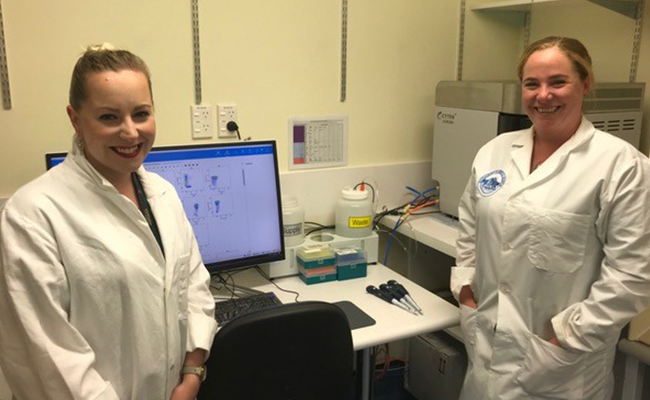Monday 14 December 2020 9:54am

Dr Kathryn Hally and Dr Kirsty Danielson with the cytometer.
The arrival of a new state-of-the-art $400,000 spectral flow cytometer on the Wellington campus will significantly enhance the University’s capacity to do biomedical research.
The cytometer which bounces lasers off reagents used to ‘tag’ the cells in fresh blood or tissue samples is the first machine of its kind to be installed on any Otago University campus.
Its acquisition was led by Department of Surgery Senior Lecturer Dr Kirsty Danielson and Postdoctoral Fellow Dr Kathryn Hally who were able to secure a major equipment grant from the University to purchase the machine.
Dr Hally, a leading expert in the technology, says the spectral flow cytometer is a step up from conventional cytometry, allowing researchers to analyse more than 30 different cell characteristics from a single, tiny, clinical sample.
Some clinical samples analysed by the cytometer need to be fresh, so having the machine on campus directly next to Wellington Hospital will greatly increase the amount of research which staff and students are able to do, Dr Hally says.
“We have been having to use equipment across town at the Malaghan Institute of Medical Research for our research projects. Having the cytometer onsite means we will be able to scale that up hugely and push through more samples and more projects, so it is very exciting.”
“Essentially, we can use it across the campus for whatever disease model people want to study.”
Dr Hally, who works with the Wellington Cardiovascular Research Group, uses the cytometer to characterise the levels of inflammation in patients’ cells after they experience heart attacks.
Dr Danielson, who works with the Surgical Cancer Research Group, uses the cytometer for research into how bowel and breast cancer tumours can affect the immune response.
They are just two examples of the uses to which the cytometer can be put, Dr Hally says.
“Essentially, we can use it across the campus for whatever disease model people want to study.”
Dr Danielson says the cytometer will increase the opportunities for researchers to collaborate with their colleagues on the Dunedin and Christchurch campuses, as well as with the clinical trials unit at the Capital and Coast District Health Board. It will also strengthen existing collaborations the University has with Victoria University of Wellington and the Malaghan Institute.
*The cytometer is housed in Collab, the collaborative laboratory space on Level H on the Wellington campus. To find out more, contact Centre of Translational Research Manager Dr Rachael Mason, Dr Danielson or Dr Hally.
